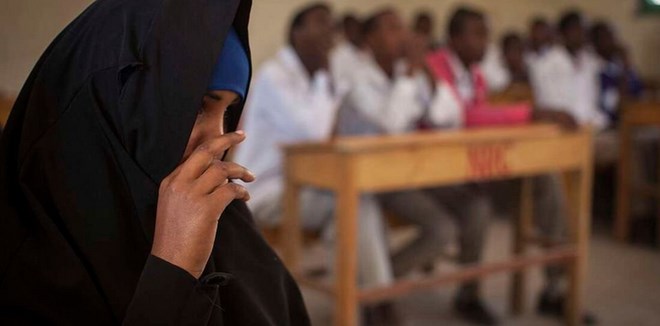Nation Africa
Sunday September 12, 2021

Somalia’s may have last week struggled with its old political problems after President Mohamed Farmaajo bitterly differed with his Prime Minister Hussein Roble. But the country faces another continual problem: female genital mutilation (FGM).
Data from the UN Population Fund (UNFPA) confirms long-held fears that Somalia is the poorest country in the Horn of Africa when it comes to containing FGM. The problem may be a direct result of Somalia’s three decades of conflict and insecurity which made large chunks of the country difficult to govern.
UNFPA data, a result of a joint survey with the UN Children’s Education Fund (UNICEF), shows that 98 per cent of Somali women aged between 15 and 49 have undergone one form of FGM or another, meaning that nearly every woman you meet on Somalia soil has been cut.
The problem though, is now being seen mostly as a cultural, rather than a political one, and UNFPA thinks it can change that by improving the way the media reports incidents of FGM.
Influence public opinion
“The media has a very strong role to play in setting an agenda and influencing public opinion. Somali journalists must know the Do’s and Don’ts of reporting on FGM,” Omar Farouk Osman, the secretary-general of the National Union of Somali Journalists (NUSOJ) said on Saturday, referring to the influence of local radio and online media platforms on public perception.
NUSOJ, which promotes the welfare of journalists, is working with UNFPA to help train journalists on reporting FGM. Officials think it can go a long way to improve general reporting on gender-based violence as well.
According to a statement from UNFPA, about 400 journalists will initially be trained on human rights, gender as well as the basics of journalism — accuracy, privacy and gender sensibilities.
The issues may be basic, but Mr Osman argued that it will be the first step to help portray FGM as a crime. It will also help change perceptions about girls.
Ending FGM is among the Sustainable Development Goals (SDGs), requiring countries to “eliminate all harmful practices such as child, early and forced marriages and female genital mutilation” by 2030.
Somalia is not the only country facing a race to end the vice.
In the Horn, an average seven in ten women in Ethiopia have undergone FGM, two in ten in Kenya, nine in ten in Sudan and one in ten in Uganda, according to UNFPA. Some countries like South Sudan and Eritrea do not even have data so it is difficult to estimate their numbers.
Responsible reporting
In Somalia, journalists are being gathered in major urban areas and cities such as Mogadishu, Baidoa, Dhusamareb, Bardhere and Beledweyne, where most media platforms operate but also where cases of
FGM have been prevalent.
“NUSOJ is advocating for responsible reporting to improve public awareness, shift audiences’ perceptions, provide a voice for those who would otherwise be silenced and expose institutional gaps that ultimately fail women,” Osman says.
“There are deeply felt beliefs about FGM that can often be extremely polarising. An informed view, one that recognises the push and pull, social, cultural and economic factors that make the practice so entrenched in communities, is absolutely necessary,” Osman said after the Mogadishu leg of training was concluded on Friday.
UNFPA says failure to report comprehensively while attaching sensibilities about FGM runs the risk of stereotyping women and girls who have undergone it. One way out of that is for journalists to stop glorifying incidents that endanger women and girls. For example, journalists are being trained to stop amplifying FGM ceremonies, for example, and instead report on the achievements of those who didn’t go through it.
Opinion leaders
The media though will only do the reporting, which means that other opinion leaders must be included, UNFPA said. As such, the UN agency has also been gathering civil society activists and religious leaders for continuous “dialogue” on FGM.
“They promised to start protecting women and girls from FGM,” the agency said of the clerics.
“UNFPA is working to mobilise health workers, including midwives, to resist social pressure to perform FGM and serve as advocates for prevention and protection in the communities they serve.”
Somalia introduced a policy against FGM in 2012, but has been lethargic in implementing it. UNFPA, however, launched a joint programme on FGM in 2008 in Somalia, working with UNICEF to convince communities to quit FGM by telling of the dangers the practice brings.
The perceptions have been difficult to change, but now officials think they can leverage on the influence of the media.